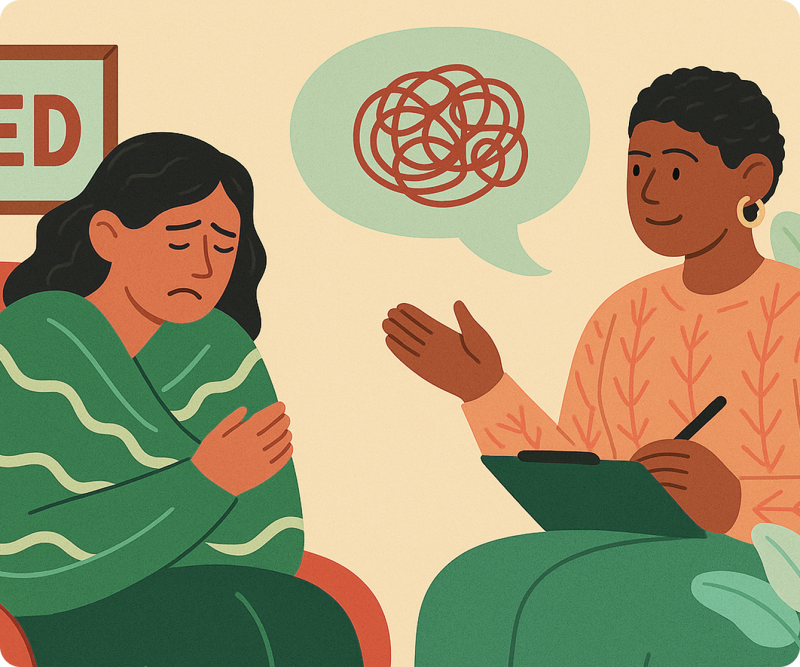
Healing from Sexual Trauma
Sexual trauma affects people of all ages, genders, and backgrounds. Whether recent or from the past, sexual trauma can have profound and lasting impacts on mental health, relationships, and overall wellbeing. Sexual trauma includes any unwanted sexual experience, from harassment and assault to childhood sexual abuse. The effects can be far-reaching, affecting how you relate to others, your sense of safety, and your relationship with your own body. Healing is possible, and you deserve compassionate, specialised support.
Common Effects of Sexual Trauma
Sexual trauma affects everyone differently, but common responses may include:
- Post-traumatic stress symptoms including flashbacks, nightmares, or intrusive thoughts
- Anxiety, panic attacks, or hypervigilance
- Depression, mood swings, or emotional numbing
- Difficulty trusting others or forming intimate relationships
- Sexual difficulties or avoidance of intimacy
- Sleep disturbances or insomnia
- Dissociation or feeling disconnected from your body
- Shame, guilt, or self-blame
- Difficulty concentrating or memory problems
- Substance use as a coping mechanism
- Self-harm or suicidal thoughts
Sexual trauma affects everyone differently, but common responses may include:These responses are normal reactions to trauma. Your feelings and experiences are valid, regardless of when the trauma occurred or the circumstances surrounding it.
Understanding Sexual Trauma
Sexual trauma can occur in many forms and contexts:
- Childhood sexual abuse by family members, caregivers, or others
- Sexual assault or rape by strangers, acquaintances, or partners
- Sexual harassment in workplace or social settings
- Non-consensual sexual experiences or coercion
- Sexual exploitation or trafficking
- Unwanted sexual contact or boundary violations
- Online sexual exploitation or image-based abuse
Trauma responses can be immediate or may emerge years later. There’s no “right” way to respond to sexual trauma, and healing happens at your own pace.
Specialised Treatment for Sexual Trauma
Recovery from sexual trauma requires specialised, trauma-informed care. At Seed Psychology, our experienced psychologists use evidence-based therapies specifically designed for trauma recovery, including Trauma-Focused Cognitive Behavioural Therapy and EMDR (Eye Movement Desensitisation and Reprocessing). Trauma-informed therapy can help you:
- Process traumatic memories in a safe, controlled way
- Develop healthy coping strategies for managing symptoms
- Address negative beliefs about yourself and the world
- Rebuild trust and improve relationships
- Reconnect with your body and reclaim your sense of agency
- Work through feelings of shame, guilt, and self-blame
- Develop safety planning and self-protection skills
- Restore your sense of empowerment and control
We understand that discussing sexual trauma requires immense courage, and we’re committed to providing a safe, non-judgmental space for your healing journey.
You Are Not Alone in Your Healing Journey
Sexual trauma is never your fault, and healing is possible. Many survivors go on to live fulfilling lives and develop meaningful relationships with appropriate support and treatment.
Our compassionate, trauma-informed team at Seed Psychology specialises in supporting survivors of sexual trauma. We understand the unique challenges you face and are here to walk alongside you on your path to healing and recovery.
Connect with us to book an appointment with a psychologist in our Brunswick clinic or via telehealth Australia-wide.
Through connection,
change is possible
Our compassionate team at Seed Psychology is here to help you regain your wellbeing and navigate life’s challenges with greater confidence and clarity. Connect with us to book an appointment with a psychologist in our Brunswick clinic or via telehealth Australia-wide.
Available resources
Meet our amazing team of therapists
Our diverse team of psychologists offer individual, couples, and online therapy, as well as assessments. Beyond their expertise, they bring humanity and care, providing respectful, affirming support tailored to each person’s unique experience.
Freqeuently asked questions
-
Therapy is a shared process. While your Psychologist brings expertise, insight, and support, the most meaningful outcomes often come when you’re actively engaged in your own growth. This means being open and honest during sessions, reflecting between appointments, and being willing to try new approaches-even when it feels challenging. Therapy can take time, and progress isn’t always linear, but your commitment matters. Here are some ways to support your journey:
- Be open and honest with your Psychologist, even (and especially) if something feels hard to say.
- Give feedback if something doesn’t feel right or if your needs change.
- Stay open to exploring new ideas and practices within a safe, supportive space.
- Take notes or keep a journal to reflect on insights or patterns between sessions.
- Try to attend regularly-consistency is key to building momentum.
- Be kind to yourself. Growth can be uncomfortable at times, but that doesn’t mean you’re doing it wrong.
- Invest in your wellbeing outside of therapy by building habits and routines that nourish you.
Therapy is a courageous act of self-investment. By showing up and staying engaged, you create space for real and lasting change.
-
Our experienced team of Psychologists offers warm, evidence-based support that’s collaborative, inclusive and grounded in genuine understanding. We provide individual, relationship or family therapy for a wide range of concerns. Additionally, we offer couples therapy, online therapy, psychological assessments (including ADHD and Autism Spectrum Assessments), and workshops.
-
There’s no one-size-fits-all answer to how long therapy takes. At Seed Psychology, we tailor each intervention to your individual needs, goals, and circumstances. Some people come to therapy to navigate a specific challenge, like managing anxiety, adjusting to a life transition, or processing a relationship difficulty. Others may be seeking deeper emotional growth or support for longer-term concerns. Because of this, the number of sessions can vary. Many clients attend between 6 and 18 sessions, though some need fewer and others continue for longer. Your Psychologist will discuss an estimated treatment plan with you after your initial assessment and continue checking in over time to ensure it feels helpful and aligned with your goals. Ultimately, the pace and duration of therapy is something we navigate together, guided by your progress, preferences, and what feels right for you.
-
Consultations with a psychologist last between 50 and 60 minutes.
-
At Seed Psychology, your safety and wellbeing are our highest priorities. While we are here to support you through regular therapy sessions, we are not a crisis service and may not be available outside of scheduled appointments. If you or someone you care about is in immediate danger, experiencing a mental health crisis, or needs urgent support, it’s important to seek help straight away through the appropriate emergency or crisis services. You can find a list of trusted organisations and services here that can provide immediate support when you need it most.








